牛津深圳版八年级下册英语期中复习语法知识点总结
牛津版 八年级英语下 期中复习要点
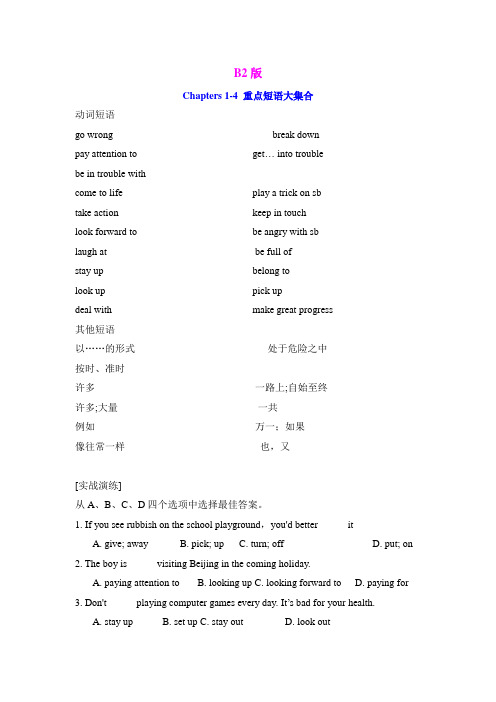
B2版Chapters 1-4 重点短语大集合动词短语go wrong break downpay attention to get… into troublebe in trouble withcome to life play a trick on sbtake action keep in touchlook forward to be angry with sblaugh at be full ofstay up belong tolook up pick updeal with make great progress其他短语以……的形式处于危险之中按时、准时许多一路上;自始至终许多;大量一共例如万一;如果像往常一样也,又[实战演练]从A、B、C、D四个选项中选择最佳答案。
1. If you see rubbish on the school playground,you'd better _____ it _____A. give; awayB. pick; upC. turn; offD. put; on2. The boy is _____ visiting Beijing in the coming holiday.A. paying attention toB. looking upC. looking forward toD. paying for3. Don't _____ playing computer games every day. It’s bad for your health.A. stay upB. set upC. stay outD. look out4. Tom gets to school _____ every day. He has never been late for school.A. at timesB. on timeC. in dangerD. on line5. --- How many storybooks do you have _____?--- Ten.A. in caseB. all the wayC. as usualD. in total1. We won't start the meeting _____ our teacher arrives. (2010天津)A. thoughB. untilC. whileD. or2. It's quite common in Britain to say “Thank you” to the drivers _____ people get off the bus.(2009河南)A. afterB. sinceC. untilD. when现场拆招:时间状语从句常用连词有when,while,after,until,since等。
语法知识点期中复习课件2021-2022学年牛津深圳版八年级英语下册
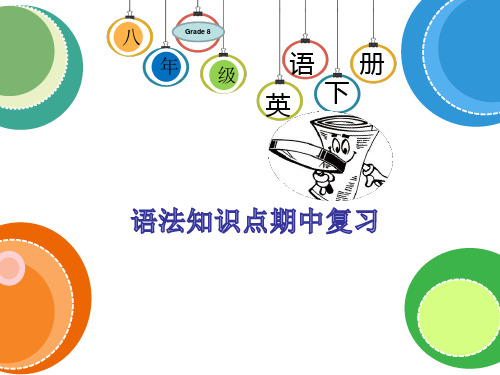
考点导航 第三单元知识点:
一般过去时的被动语态:
1
主语+was / were + 动词的过去分词
Have a try!
13.Don't worry. Your package
here until you
come back, so enjoy shopping here.
A. will keep
√C. will be kept
一般现在时的被动语态:
主语+am / is / are + 动词的过去分词
1
Have a try!
12.Many accidents____ by careless drivers last year.
A. are caused
√B. were caused
C. have caused
D. will cause
√A. not to play
B. to play not
C. not playing
D. not play
考点导航
第一单元知识点:动词不定式的否定形式
1
not to do sth.
Have a try!
4.But it takes an average of 25 years for a new tree ____.
fin1ish, practise, keep。2)常考“介词+动名词”的
短语有:prefer... to, be used to, look forward to , feel like, keep on, be afraid of, succeed in等。
Have a try!
10.A lot of museums in China are worth ________. If you
深圳牛津英语八年级下册重点知识点总结(单词短语和语法)
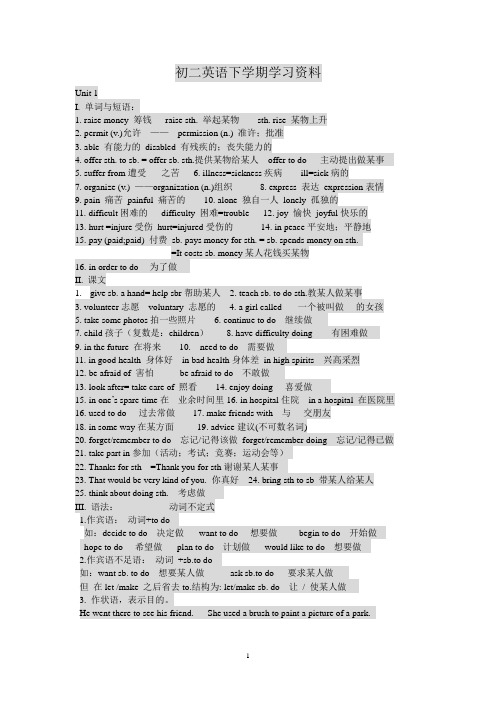
初二英语下学期学习资料Unit 1I. 单词与短语:1. raise money 筹钱raise sth. 举起某物sth. rise 某物上升2. permit (v.)允许——permission (n.) 准许;批准3. able 有能力的disabled 有残疾的;丧失能力的4. offer sth. to sb. = offer sb. sth.提供某物给某人offer to do--- 主动提出做某事5. suffer from遭受-----之苦6. illness=sickness疾病ill=sick病的7. organize (v.) ——organization (n.)组织8. express 表达expression表情9. pain 痛苦painful 痛苦的10. alone 独自一人lonely 孤独的11. difficult困难的difficulty 困难=trouble 12. joy 愉快joyful快乐的13. hurt =injure受伤hurt=injured受伤的14. in peace平安地;平静地15. pay (paid;paid) 付费sb. pays money for sth. = sb. spends money on sth.=It costs sb. money某人花钱买某物16. in order to do ---为了做----II. 课文1.give sb. a hand= help sbr帮助某人2. teach sb. to do sth.教某人做某事3. volunteer志愿voluntary 志愿的4. a girl called --- 一个被叫做----的女孩5. take some photos拍一些照片6. continue to do---继续做-----7. child孩子(复数是:children)8. have difficulty doing ---- 有困难做---- 9. in the future 在将来10. need to do---需要做----11. in good health 身体好in bad health身体差in high spirits 兴高采烈12. be afraid of 害怕---- be afraid to do---不敢做-----13. look after= take care of 照看14. enjoy doing----喜爱做------15. in one’s spare time在---业余时间里16. in hospital住院in a hospital 在医院里16. used to do----过去常做----- 17. make friends with---与----交朋友18. in some way在某方面19. advice建议(不可数名词)20. forget/remember to do---忘记/记得该做forget/remember doing---忘记/记得已做21. take part in参加(活动;考试;竞赛;运动会等)22. Thanks for sth---=Thank you for sth谢谢某人某事23. That would be very kind of you. 你真好24. bring sth to sb 带某人给某人25. think about doing sth. 考虑做------III. 语法:动词不定式1.作宾语:动词+to do---如:decide to do---决定做-----want to do----想要做---- begin to do---开始做--- hope to do----希望做---- plan to do---计划做---- would like to do---想要做---2.作宾语不足语:动词+sb.to do---如:want sb. to do---想要某人做---- ask sb.to do--- 要求某人做-----但在let /make 之后省去to.结构为: let/make sb. do---让/ 使某人做----3. 作状语,表示目的。
2020-2021学年牛津深圳版八年级英语下册知识讲义语法讲解(动词不定式)

知识梳理【教材原句】They offered to do some voluntary work to help children in need.他们主动做些志愿工作来帮助有需要的那些孩子们。
【概念】由“to+动词原形”构成,在句子不能作谓语,没有人称和数的变化。
其否定形式为:not to+动词原形。
其被动语态形式为:to be+动词过去分词。
动词不定式在句中可以作主语、宾语、表语、定语、状语和补语。
1. 动词不定式在句首作主语的时候,谓语动词通常用第三人称单数形式。
不定式放在句尾作真正主语时,前面通常用it作形式主语,即:It’s+形容词+of / for sb.+不定式。
其中的介词of常与表示性格特征的形容词连用,其他类的形容词常与介词for连用。
To learn foreign languages is difficult. 学外语很难。
=It’s difficult to learn foreign languages.To watch some cartoons is very interesting.看卡通片很有趣。
=It’s very interesting to watch some cartoons.It’s kind of you to help the disabled man.你真善良,帮助那个残疾人。
It’s important for you to wear sunglasses.对你来说,戴太阳镜是很重要的。
It’s friendly of you _________ these food for us.A. carryingB. carryC. to carryD. will carry答案:C思路分析:这是一个用动词不定式作真正主语,而以it作形式主语的固定句型:It’s + 形容词+of / for to do,所以选C。
2. 动词不定式,通常放在一些动词、动词短语或固定短语的后面作宾语。
牛津英语八年级下册知识点梳理汇总
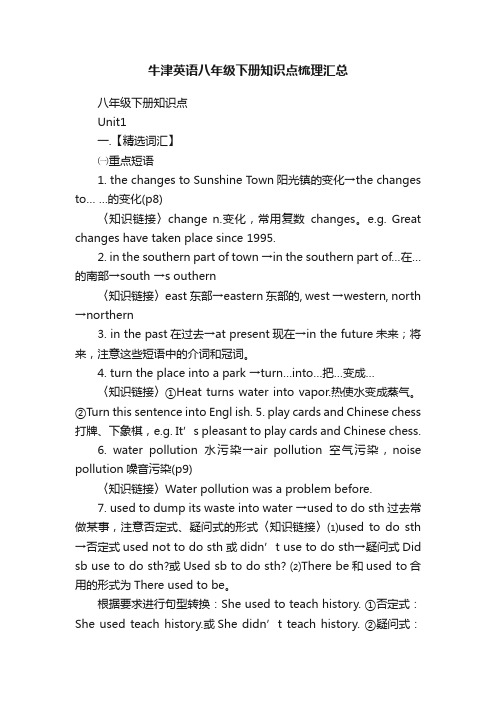
牛津英语八年级下册知识点梳理汇总八年级下册知识点Unit1一.【精选词汇】㈠重点短语1. the changes to Sunshine Town阳光镇的变化→the changes to… …的变化(p8)〈知识链接〉change n.变化,常用复数changes。
e.g. Great changes have taken place since 1995.2. in the southern part of town →in the southern part of…在…的南部→south →s outhern〈知识链接〉east东部→eastern东部的, west →western, north →northern3. in the past在过去→at present现在→in the future未来;将来,注意这些短语中的介词和冠词。
4. turn the place into a park →turn…into…把…变成…〈知识链接〉①Heat turns water into vapor.热使水变成蒸气。
②Turn this sentence into Engl ish. 5. play cards and Chinese chess 打牌、下象棋,e.g. It’s pleasant to play cards and Chinese chess.6. water pollution水污染→air pollution空气污染,noise pollution噪音污染(p9)〈知识链接〉Water pollution was a problem before.7. used to dump its waste into water →used to do sth过去常做某事,注意否定式、疑问式的形式〈知识链接〉⑴used to do sth →否定式used not to do sth或didn’t use to do sth→疑问式Did sb use to do sth?或Used sb to do sth? ⑵There be和used to合用的形式为There used to be。
牛津英语八年级下册知识点梳理

八年级下册知识点Unit1 一【精选词汇】【精选词汇】㈠重点短语㈠重点短语1. the changes to Sunshine Town 阳光镇的变化→the changes to … …的变化的变化 (p8)〈知识链接〉change n.变化,常用复数变化,常用复数changes 。
e.g. Great changes have taken place since 1995.2. in the southern part of town →in the southern part of …在…的南部→south →southern〈知识链接〉east 东部→eastern 东部的, west →western, north →northern 3. in the past 在过去→at present 现在→in the future 未来;将来,注意这些短语中的介词和冠词。
未来;将来,注意这些短语中的介词和冠词。
4. turn the place into a park →turn …into …把…变成…〈知识链接〉①Heat turns water into vapor.热使水变成蒸气。
②Turn this sentence into English.5. play cards and Chinese chess 打牌、下象棋,e.g. It ’s pleasant to play cards and Chinese chess.6. water pollution 水污染→air pollution 空气污染,noise pollution 噪音污染噪音污染 (p9)〈知识链接〉Water pollution was a problem before. 7. used to dump its waste into water →used to do sth 过去常做某事,注意否定式、疑问式的形式过去常做某事,注意否定式、疑问式的形式过去常做某事,注意否定式、疑问式的形式 〈知识链接〉⑴used to do sth →否定式used not to do sth 或didn ’t use to do sth→疑问式Did sb use to do sth?或Used sb to do sth? ⑵There be 和used to 合用的形式为There used to be 。
牛津专版八年级下册 Unit 1 至 Unit 8 词汇 语法知识点梳理
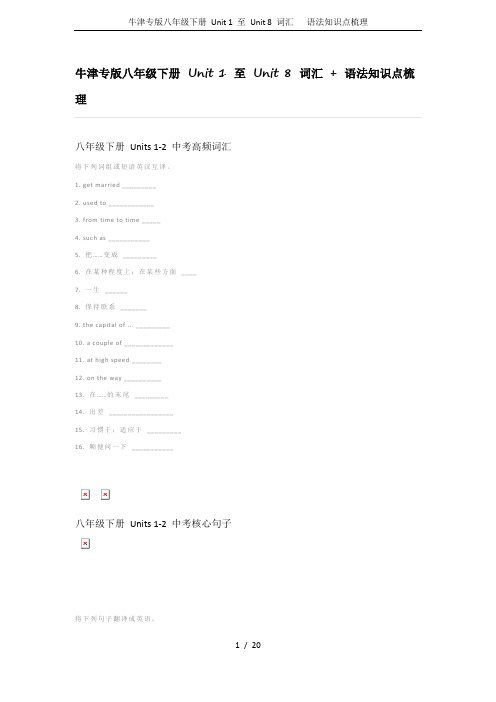
牛津专版八年级下册Unit 1 至Unit 8 词汇+ 语法知识点梳理八年级下册Units 1-2 中考高频词汇将下列词组或短语英汉互译。
1. get married _________2. used to ____________3. from time to time _____4. such as ___________5. 把……变成_________6. 在某种程度上;在某些方面____7. 一生______8. 保持联系_______9. the capital of ... _________10. a couple of _____________11. at high speed ________12. on the way __________13. 在……的末尾_________14. 出差_________________15. 习惯于;适应于_________16. 顺便问一下___________八年级下册Units 1-2 中考核心句子将下列句子翻译成英语。
1. 他过去经常去河里游泳。
___________________________________2. 我已经习惯了在这里生活。
___________________________________3. 我哥哥不在家,他去图书馆了。
___________________________________4. 他们离开上海一年了。
___________________________________5. 我保证你会喜欢我的礼物的。
___________________________________八年级下册Units 1-2 中考核心语法考点一:现在完成时的基本用法现在完成时表示从过去持续到现在的动作或状态,或已完成但对现在有一定影响的动作。
它的结构是“主语+have / has+ 动词过去分词+其他”。
常和already、ever、just、never、recently、yet 等副词以及since 和for 引导的时间状语连用。
期中复习专题二重要语法复习牛津译林版英语八年级下册
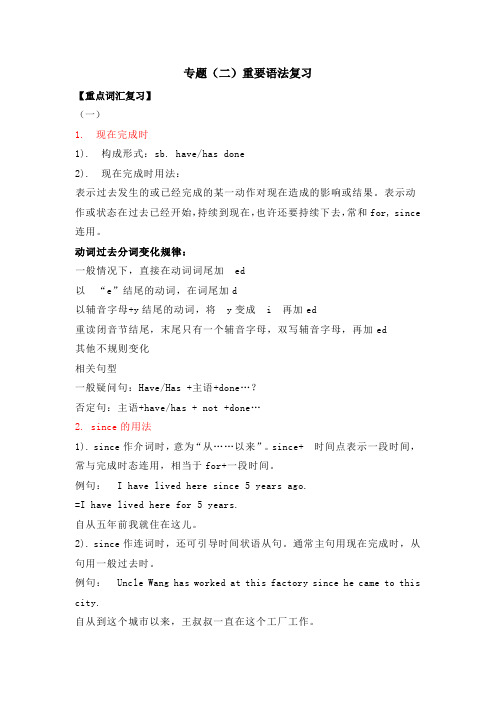
专题(二)重要语法复习【重点词汇复习】(一)1. 现在完成时1). 构成形式:sb. have/has done2). 现在完成时用法:表示过去发生的或已经完成的某一动作对现在造成的影响或结果。
表示动作或状态在过去已经开始,持续到现在,也许还要持续下去,常和for, since 连用。
动词过去分词变化规律:一般情况下,直接在动词词尾加ed以“e”结尾的动词,在词尾加d以辅音字母+y结尾的动词,将y变成i 再加ed重读闭音节结尾,末尾只有一个辅音字母,双写辅音字母,再加ed其他不规则变化相关句型一般疑问句:Have/Has +主语+done…?否定句:主语+have/has + not +done…2. since的用法1). since作介词时,意为“从……以来”。
since+ 时间点表示一段时间,常与完成时态连用,相当于for+一段时间。
例句:I have lived here since 5 years ago.=I have lived here for 5 years.自从五年前我就住在这儿。
2). since作连词时,还可引导时间状语从句。
通常主句用现在完成时,从句用一般过去时。
例句:Uncle Wang has worked at this factory since he came to this city.自从到这个城市以来,王叔叔一直在这个工厂工作。
(二)1. have/ has been 与have/ has gone 用法的区别1). have/ has been表示去过某地,说话时已从该地回来。
例句:He has been to China. 他去过中国。
(表示现在他已回来) Have you ever been here before? 你以前到过这儿吗?2). have/ has gone其含义是“到某地去了(还没有回来)”。
注意:这种结构不用于第一人称,也不用于第二人称,仅用于第三人称。
深圳牛津八年级下单元语法专题梳理与复习(无答案)
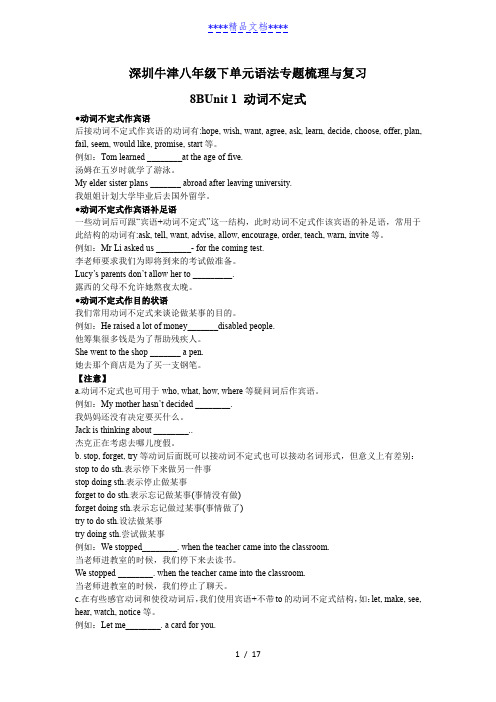
深圳牛津八年级下单元语法专题梳理与复习8BUnit1动词不定式●动词不定式作宾语后接动词不定式作宾语的动词有:hope,wish,want,agree,ask,learn,decide,choose,offer,plan, fail,seem,would like,promise,start等。
例如:Tom learned________at the age of five.汤姆在五岁时就学了游泳。
My elder sister plans_______abroad after leaving university.我姐姐计划大学毕业后去国外留学。
●动词不定式作宾语补足语一些动词后可跟“宾语+动词不定式”这一结构,此时动词不定式作该宾语的补足语,常用于此结构的动词有:ask,tell,want,advise,allow,encourage,order,teach,warn,invite等。
例如:Mr Li asked us________-for the coming test.李老师要求我们为即将到来的考试做准备。
Lucy’s parents don’t allow her to_________.露西的父母不允许她熬夜太晚。
●动词不定式作目的状语我们常用动词不定式来谈论做某事的目的。
例如:He raised a lot of money_______disabled people.他筹集很多钱是为了帮助残疾人。
She went to the shop_______a pen.她去那个商店是为了买一支钢笔。
【注意】a.动词不定式也可用于who,what,how,where等疑问词后作宾语。
例如:My mother hasn’t decided________.我妈妈还没有决定要买什么。
Jack is thinking about________..杰克正在考虑去哪儿度假。
b.stop,forget,try等动词后面既可以接动词不定式也可以接动名词形式,但意义上有差别:stop to do sth.表示停下来做另一件事stop doing sth.表示停止做某事forget to do sth.表示忘记做某事(事情没有做)forget doing sth.表示忘记做过某事(事情做了)try to do sth.设法做某事try doing sth.尝试做某事例如:We stopped________.when the teacher came into the classroom.当老师进教室的时候,我们停下来去读书。
牛津深圳版英语八年级下册词汇知识点总结复习(含答案解析)
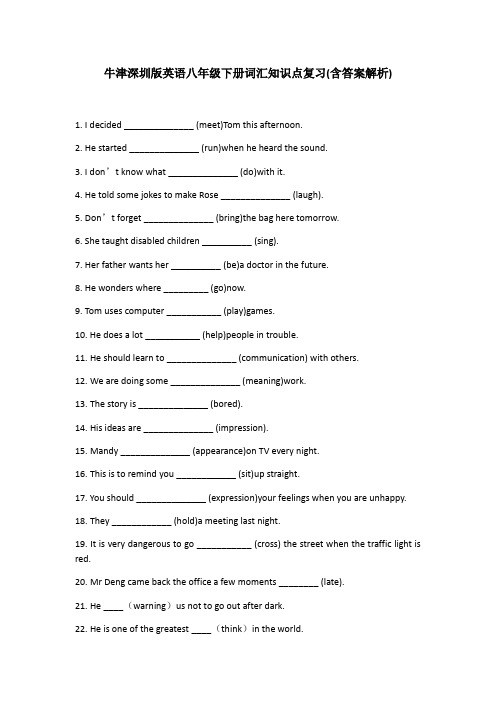
牛津深圳版英语八年级下册词汇知识点复习(含答案解析)1. I decided ______________ (meet)Tom this afternoon.2. He started ______________ (run)when he heard the sound.3. I don’t know what ______________ (do)with it.4. He told some jokes to make Rose ______________ (laugh).5. Don’t forget ______________ (bring)the bag here tomorrow.6. She taught disabled children __________ (sing).7. Her father wants her __________ (be)a doctor in the future.8. He wonders where _________ (go)now.9. Tom uses computer ___________ (play)games.10. He does a lot ___________ (help)people in trouble.11. He should learn to ______________ (communication) with others.12. We are doing some ______________ (meaning)work.13. The story is ______________ (bored).14. His ideas are ______________ (impression).15. Mandy ______________ (appearance)on TV every night.16. This is to remind you ____________ (sit)up straight.17. You should ______________ (expression)your feelings when you are unhappy.18. They ____________ (hold)a meeting last night.19. It is very dangerous to go ___________ (cross) the street when the traffic light is red.20. Mr Deng came back the office a few moments ________ (late).21. He ____(warning)us not to go out after dark.22. He is one of the greatest ____(think)in the world.23. We build a tall building from the __(basic).24. He is____(pleasant)with the gift.25. Mary has told us more ____(detailed).26. The young man ____(appear)and we never see him again.27. He ____ (actor)as a policeman in the film.28. They have their ____(separately)work to do.29. There are kinds of _____ (character)in the story.30. She always forgets ____(bring)her notebook to school.31. We should try our best to protect the animals in ____(dangerous).32. It has a white face with black _____(patch)around its eyes.33. You should have good ____(behave)in the public!34. The _____(pollute)here is more serious now.35. Singapore is an____(Asia)country.36. We each have an ____(obligate)to stop the criminal.37. I need ten _____(kilogram)of rice, please.38. She stays in a small hotel near the _____ (centre)government.39. The population of the country _____(be)very large.40. Some people are ____(kill)wild animals for their fur, meat and teeth.41. The bus driver is ______________ (responsibility)for the passengers’safety.42. Don’t worry. There are mountains of ___________(choose)for you in the big supermarket.43. _________________ (keep)a pet is a tiring job for me.44. Your explanation sounds______________ (reason), therefore, I accept your apology.45. She was ___________ (faith)to her career all her life.46. My grandmother is ___________ (near)one hundred years old now.47. Jim’s brother is __________ (lie)in bed, reading a storybook.48. I have even ___________ (bad) news for you.49. These two events have nothing in ____________ (commonly).50. The dog is ___________ (friend). You can touch it.51. Can you speak more _________ (loud)? I can’t hear you.52. Linda is __________ (know)for her great voice.53. We ______________ (receive)400 applications for the job up to now.54. The arrangement has a ____________ (damage) effect on poorer families.55. We have to stand up to them and not be ______________ (frighten)of them.56. A new planet, much like the Earth they say, was ______________ (discover)this month.57. Gavin was a ______________ (wonder)gifted kid.58.This ancient ____________(create)has changed little since the time of dinosaurs.59. They ____________ (spread)a towel on the sand and sat on it.60.The winner of the race looked very __________ (please).61. I will _________ (certain) lend my bike to you.62. The company tries hard to __________ (satisfied) its customers.63. When you do something wrong, you need to make an ___________ (apology).64. The shop mainly sells ____________ (electricity) products.65.The country has made great progress in science and ______________ (technologic).66.The mother was so worried about her son, but she didn’t know what _________ (do).67. She has trouble __________ (tell) red from green.68. He is angry now. You’d better _______ (leave) him alone.69. Nowadays, a lot of people worry about __________ (get) a job.70. I forgot __________ (call) you yesterday because I was too busy.答案详解:1.to meet 短语decide to do2.to run 短语start to do3.to do 特殊疑问词固定结构what to dough 短语make sb do...5.to bring 短语forget to..6.to sing 短语forget to..7.to be 短语teach sb to do8.to go 特殊疑问词固定结构where to go9.to play 短语use sth to do...10.to help 短语municate 短语learn to do显然填动词圆形,communication是名词12.meaningful 句意表达的是有意义的工作,填形容词,这里后缀为ful13.boring 这里修饰的是物story,所以用boring,修饰人用bored14.impressive 句子结构为主系表,用形容词作表语,填impressive令人印象深刻的15.appears 时间状语为every night,故用一般现在时16.to sit 短语remind sb to...提醒某人...17.express 情态动词后接动词原形,填动词express18.held 时间状语last night,过去的时间状语要用过去式held19.across 短语go across穿过,通过ter late是形容词,这里是a few moments later用副词稍后21.warns/warned 根据句子结构分析要填谓语动词,没有明确的时间状语可以填一般现在时或一般过去时22.thinkers 句意分析要名词thinker,因为One of...结构所以填复数thinkers23.base 前面有定冠词这里句子分析是填名词base, basic是形容词24.pleased 短语be pleased with...对...满意25.details 首先分析这里填名词,前面more提示句意是更多的细节,填复数更合理26.disappears 第三人称单数加s27.acts/acted 根据句子结构分析要填谓语动词,没有明确的时间状语可以填一般现在时或一般过去时28.separate 这里是形容词修饰名词work,故填形容词separate29.characters 前面是复数are,故用复数加s30.to bring 短语forget to do31.danger 固定短语in danger在危险中的32.patches 后面eyes用复数,这里保持一致用复数black patches很多黑色的斑点33.behaviour 这里用名词behaviour行为,习惯34.pollution 主语是名词,pollute是动词,它的名词后缀是tionn 要用形容词,亚洲的Asian36.obligation 句子分析显然填名词obligation37.kilograms 前面单词ten,显然用复数38.central 这里要填修饰government的形容词central39.is 污染是不可数名词,所以后面be动词用单数40.killing 句意为正在宰杀,要用现在进行时41.responsible be responsible for对...负责42.choices 填名词choice的复数43.Keeping/To keep 记住动词不能直接作主语,要用动词的正确形式,这里用动名词或动词不定式作主语表目的和方式44.reasonable 句子为主系表结构,所以sounds后接形容词45.faithful 这里显然要填形容词,faith后面加ful后缀变形容词46.nearly 句意为几乎,接近填nearly47.lying 动作正在发生,lying48.worse 句意为更糟糕的,用比较级worsemon 固定用法in common普遍的50.friendly 主系表结构,be动词后接形容词当表语51.loudly 副词loudly修饰动词speak52.known 固定搭配be known for以....出名53.have received up to now到现在为止,动作一直持续到现在,用现在完成时54.damaging damage是动词,这里要填形容词damaging,正产生危险的...55.frightened 固定用法be frightened of...对...感到恐惧56.discovered 根据句意是被发现,用被动语态be discovered57.wonderfully 后面gifted是形容词,副词修饰形容词,要用wonderfully58.creature 前面ancient是形容词后面要用名词,填creature生物59.spread 根据后半句内容时态为过去式,所以填spread的过去式,是它本身spread60.pleased 主系表结构,look后面接形容词pleased满意的61.certainly 副词修饰动词lend,填certainly62.satisfy try to do sth努力让客户满意,这里要填动词satisfy63.apology 词组make an apology64.electronic 电子产品,用形容词electronic来修饰products65.technology 根据science同理得出要填名词,科学与技术66.to do 固定用法what to do67.telling 短语have trouble doing sth...做...有困难68.leave 短语leave sb alone让某人单独一个人69.getting 介词about后面接动词的ing形式70.to call 短语forget to do sth忘记做某事。
牛津英语八年级下册知识点梳理

八年级下册知识点Unit1一.【精选词汇】㈠重点短语1.thechangestoSunshineTown阳光镇的变化→thechangesto……的变化(p8)〈知识链接〉changen.变化,常用复数changes。
e.g.Greatchangeshavetakenplacesince1995.2.inthesouthernpartoftown→inthesouthernpartof…在…的南部→south→southern〈知识链接〉east东部→eastern东部的,west→western,north→northern3.inthepast在过去→atpresent现在→inthefuture未来;将来,注意这些短语中的介词和冠词。
〈知识链或②疑问式:〈用法拓=e.g.①⑵abitof〈〉①12.thebestmodelIhaveeverseen我曾见过的最好的模型(p17)〈知识链接〉the+形容词最高级+名词单数+sbhave/haseverdone,某人曾做过的最…的…themostwonderfulfilm(that)hehaseverwatched他看过的最精彩的比赛〈用法拓展〉⑴ever通常用于疑问句中或否定句中。
e.g.①Have/Hassbeverdonesth?②Nobodyeversteppedinthiscavern.没人曾经踏进过这洞穴。
⑵eversince…自从…起到现在(用于现在完成时),forever=forever永远;永久地13.moveintothenewflats→moveinto…搬进…,moveoutof…搬出…(p18)14.lendmeabook→lendsbsth=lendsthtosb把某物借给某人,是“借出”。
〈知识链接〉borrowsthfromsb向某人借某物,是“借入”。
15.arecentphoto一张近期照片,writeaboutthechangestoMoonlightTown(p21)16.atouristattraction旅游胜地→attractionn.吸引;向往的地方→attractvt.吸引→attractive有吸引力的①Ithasbecomeanewtouristattraction.②Hepburn’sbeautyandcharmattractedColette’sattention.㈡词汇解析1.常见的交通工具:bike/bicycle,bus,double-decker双层巴士,coach长途汽车,tram有轨电车,taxi,train,underground,lightrail轻轨,plane,hot-airballoon热气球,aerodone滑翔机ingadictionary:Thewordsinadictionaryareinalphabeticalorderfrom“A”to“Z”.Thishelpsusfindthewordswewantquickly. Iftwowordsstartswiththesameletter,welookatthesecondlettertodecidethealphabeticalorder.Ifthefirsttwolettersoftwowordsar ethesame,welookatthethirdletter,andsoon.e.g.Theword“ball”comesbeforetheword“banana”.3.century=onehundredyears世纪;百年。
牛津英语八年级下册知识点梳理汇总
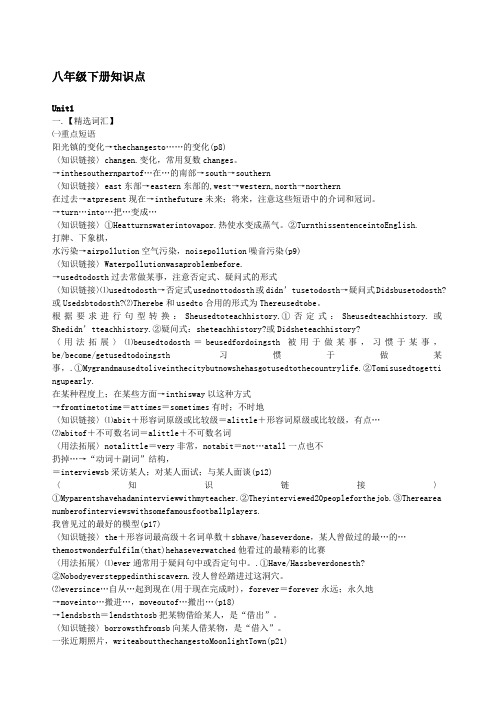
八年级下册知识点Unit1一.【精选词汇】㈠重点短语阳光镇的变化→thechangesto……的变化(p8)〈知识链接〉changen.变化,常用复数changes。
→inthesouthernpartof…在…的南部→south→southern〈知识链接〉east东部→eastern东部的,west→western,north→northern在过去→atpresent现在→inthefuture未来;将来,注意这些短语中的介词和冠词。
→turn…into…把…变成…〈知识链接〉①Heatturnswaterintovapor.热使水变成蒸气。
②TurnthissentenceintoEnglish.打牌、下象棋,水污染→airpollution空气污染,noisepollution噪音污染(p9)〈知识链接〉Waterpollutionwasaproblembefore.→usedtodosth过去常做某事,注意否定式、疑问式的形式〈知识链接〉⑴usedtodosth→否定式usednottodosth或didn’tusetodosth→疑问式Didsbusetodosth?或Usedsbtodosth?⑵Therebe和usedto合用的形式为Thereusedtobe。
根据要求进行句型转换:Sheusedtoteachhistory.①否定式:Sheusedteachhistory.或Shedidn’tteachhistory.②疑问式:sheteachhistory?或Didsheteachhistory?〈用法拓展〉⑴beusedtodosth=beusedfordoingsth被用于做某事,习惯于某事,be/become/getusedtodoingsth习惯于做某事,.①Mygrandmausedtoliveinthecitybutnowshehasgotusedtothecountrylife.②Tomisusedtogetti ngupearly.在某种程度上;在某些方面→inthisway以这种方式→fromtimetotime=attimes=sometimes有时;不时地〈知识链接〉⑴abit+形容词原级或比较级=alittle+形容词原级或比较级,有点…⑵abitof+不可数名词=alittle+不可数名词〈用法拓展〉notalittle=very非常,notabit=not…atall一点也不扔掉…→“动词+副词”结构,=interviewsb采访某人;对某人面试;与某人面谈(p12)〈知识链接〉①Myparentshavehadaninterviewwithmyteacher.②Theyinterviewed20peopleforthejob.③Therearea numberofinterviewswithsomefamousfootballplayers.我曾见过的最好的模型(p17)〈知识链接〉the+形容词最高级+名词单数+sbhave/haseverdone,某人曾做过的最…的…themostwonderfulfilm(that)hehaseverwatched他看过的最精彩的比赛〈用法拓展〉⑴ever通常用于疑问句中或否定句中。
【最新】牛津深圳版八年级英语下册Unit1知识点语法精讲精练
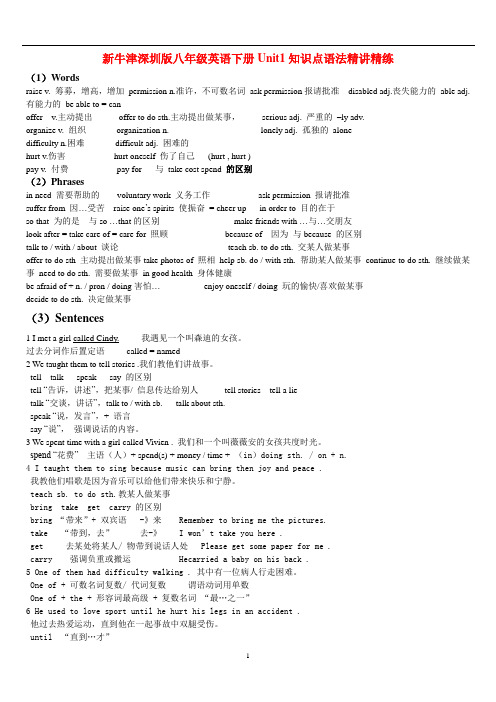
新牛津深圳版八年级英语下册Unit1知识点语法精讲精练(1)Wordsraise v. 筹募,增高,增加permission n.准许,不可数名词ask permission报请批准disabled adj.丧失能力的able adj. 有能力的be able to = canoffer v.主动提出offer to do sth.主动提出做某事,serious adj. 严重的–ly adv.organize v. 组织organization n. lonely adj. 孤独的alonedifficulty n.困难difficult adj. 困难的hurt v.伤害hurt oneself 伤了自己(hurt , hurt )pay v. 付费pay for 与take cost spend 的区别(2)Phrasesin need 需要帮助的voluntary work 义务工作ask permission 报请批准suffer from 因…受苦raise one’s spirits 使振奋= cheer up in order to 目的在于so that 为的是与so …that的区别make friends with …与…交朋友look after = take care of = care for 照顾because of 因为与because 的区别talk to / with / about 谈论teach sb. to do sth. 交某人做某事offer to do sth 主动提出做某事take photos of 照相help sb. do / with sth. 帮助某人做某事continue to do sth. 继续做某事need to do sth. 需要做某事in good health 身体健康be afraid of + n. / pron / doing害怕…enjoy oneself / doing 玩的愉快/喜欢做某事decide to do sth. 决定做某事(3)Sentences1 I met a girl called Cindy.我遇见一个叫森迪的女孩。
牛津英语八年级下册知识点梳理

八年级下册知识点Unit1一.【精选词汇】㈠重点短语1. the changes to Sunshine Town阳光镇的变化→the changes to… …的变化(p8)2. in the southern part of town →in the southern part of…在…的南部→south →southern〈知识链接〉east东部→eastern东部的, west →western, north →northern3. in the past在过去→at present现在→in the future未来;将来,注意这些短语中的介词和冠词。
4. turn the place into a park →turn…into…把…变成…〈知识链接〉①Heat turns water into vapor.热使水变成蒸气。
②Turn this sentence into English.6. water pollution水污染→air pollution空气污染,noise pollution噪音污染(p9)〈知识链接〉Water pollution was a problem before.7. used to dump its waste into water →used to do sth过去常做某事,注意否定式、疑问式的形式〈知识链接〉⑴used to do sth →否定式used not to do sth或didn’t use to do sth→疑问式Did sb use to do sth?或Used sb to do sth? ⑵There be和used to合用的形式为There used to be。
根据要求进行句型转换:She used to teach history. ①否定式:She used teach history.或She didn’t teach history. ②疑问式:she teach history?或Did sheteach history?〈用法拓展〉⑴⑵①My grandma used to live in the city but now she has got used to the country life. ②Tom is used to getting up early.8. in some ways在某种程度上;在某些方面→in this way以这种方式9. feel a bit lonely from time to time →from time to time=at times=sometimes有时;不时地〈知识链接〉⑴a bit+形容词原级或比较级=a little+形容词原级或比较级,有点…⑵〈用法拓展〉not a little=very非常,not a bit=not…at all一点也不11. have an interview with sb=interview sb采访某人;对某人面试;与某人面谈(p12)〈知识链接〉①My parents have had an interview with my teacher. ②They interviewed 20 people for the job.③There are a number of interviews with some famous football players.12. the best model I have ever seen 我曾见过的最好的模型(p17)〈知识链接〉the+形容词最高级+名词单数+sb have/has ever done,某人曾做过的最…的…the most wonderful film (that) he has ever watched他看过的最精彩的比赛②Nobody ever stepped in this cavern.没人曾经踏进过这洞穴。
- 1、下载文档前请自行甄别文档内容的完整性,平台不提供额外的编辑、内容补充、找答案等附加服务。
- 2、"仅部分预览"的文档,不可在线预览部分如存在完整性等问题,可反馈申请退款(可完整预览的文档不适用该条件!)。
- 3、如文档侵犯您的权益,请联系客服反馈,我们会尽快为您处理(人工客服工作时间:9:00-18:30)。
牛津深圳版八年级下册英语期中复习语法知识点总结Unit 1 不定式一、一些动词常接动词不定式作宾语,如want, decide, hope, ask, agree, choose, learn, plan, need,teach, prepare 等。
注:有些动词后面可接不定式作宾语,也可接动名词作宾语,但所表达的意义不同。
(1)stop to do sth.停止正在做的事,去做另一件事;stop doing sth. .停止正在做的事(2)go on to do sth. 做完一件事后,继续做另一件事;go on doing sth.继续做同一件事(3)remember/forget to do sth.记住/忘记去做某事;remember/forget doing sth. 记得/忘记做过某事二、不定式结构中,不定式前加一个疑问代词(what, which, who, whom, whose )或疑问副词(where, when, how, why),以及连词whether 构成特殊的不定式短语,常见的可以接这种不定式短语的动词有:know, see, decide, tell, ask, consider, discover, explain, find out, forget, guess, hear, imagine, learn, remember, think, understand, wonder 等。
例:I couldn’t decide which book to choose.I can tell you where to get this book.三、有些动词,如tell, ask, want, invite, teach, like, call 等可接带to 的动词不定式作宾语补足语,构成tell/ask/want /call/invite sb. to do sth.结构。
He asked you to call him at ten o’clock.注意:动词不定式作使役动词和感官动词的宾语补足语时应省去to,在被动语态中应加上to。
这些动词可归纳为“一感(feel),二听(listen to, hear),三让(let, make, have,,四看(look at, see, watch, notice),半帮助(help)(即在动词h elp 后面作宾语补足语时,to 可有可无)”。
另有口诀帮助记忆:“感使动词真奇怪,to 在句中像妖怪,主动句中to 离开,被动句中to 回来。
”(let不用于被动语态)I will have the students write a passage about Internet.四、动词不定式还可表目的He went to the hospital to help the sick children.他去医院帮助生病的孩子们。
Unit 2 动名词1.动名词定义动名词既有动词的特征,又有名词的特征。
2.动名词的构成动词原形+ing3.动名词的作用(1)作主语Reading is an art.读书是一种艺术。
Climbing mountains is really fun.爬山真是有趣动名词作主语时,一般表示经常性、习惯性的动作,谓语动词用单数。
有时也用it作形式主语,把真正的主语后置。
(2)作宾语有些动词后出现非限定性动词时只能用动名词作宾语,不能用不定式。
常见的此类动词有:advise, allow, permit, avoid, imagine, include, keep, put off, delay, resist, depend on, think about, set about, succeed in, worry about, burst out, insist on, can’t stand, get used to, devote…to…, look forward to, pay attention to, get down to,escape 等。
①动名词作动词的宾语记忆口诀:完成实践值得忙finish, practice, be worth, be busy继续习惯别放弃keep on, be used to, give up考虑建议不禁想consider, suggest, can’t help, feel like喜欢思念要介意enjoy, miss, mindWould you mind opening the window?你介意打开窗户吗?②动名词作介词的宾语I am used to getting up early in the morning.我习惯于早上早起。
Unit3 被动语态1.结构:被动语态由“助动词be+及物动词的过去分词”构成。
2.怎么变:主动语态变被动语态时,主动语态句中的宾语变成被动语态句中的主语,主动语态句中的主语成为被动语态句中的动作的执行者变被动句步骤1、把原主动句中的宾语变为被动句的主语2、把动词变为被动形式即be +过去分词,并注意其人称和数随主语的变化,而动词的时态则保持不变。
3、原主动句的主语如需要则放在by后面以它的宾格形式出现(注代词的宾格),如不需要则可省略。
4、其它的成分(定语、状语)不变。
口诀一般现在时、一般过去时用be +及物动词的.过去分词,be有人称、时、数变。
一般将来shall(will)do,被动变do为be done。
一般现在时:主:We believe him.被:He is believed by us.一般过去时:主:He bought his children some pens.被:Some pens were bought for his children by him.一般将来时:主:Everyone will know the truth soon .被:The truth will be known by everyone.不用被动语态的情况1)不及物动词或动词短语无被动语态(即多数的瞬间动词):appear, die死亡,disappear, end (vi.结束), fail, happen, last, lie, remain, sit, spread, stand, break out, come true, fall asleep, keep silence, lose heart, take place.After the fire, very little remained of my house.比较:rise, fall, happen是不及物动词;raise, seat是及物动词。
(错)The price has been risen.(对)The price has risen.(错)The accident was happened last week.(对)The accident happened last week.(错)The price has raised.(对)The price has been raised.(错)Please seat.(对)Please be seated.2)不能用于被动语态的及物动词或动词短语:fit, have, hold, marry, own, wish, cost, notice, watch agree with, arrive at / in, shake hands with, succeed in, suffer from, happen to, take part in, walk into, belong toThis key just fits the lock.3)系动词无被动语态(“keep”除外):appear, be, become, fall, feel, get, grow, look, remain, seem, smell, sound, stay, taste, turn. It sounds good.4)带同源宾语的及物动词,反身代词,相互代词,不能用于被动语态:die, death, dream, live, lifeShe dreamed a bad dream last night.5)当宾语是不定式时,很少用于被动语态。
(对)She likes to swim.(错)To swim is liked by her.Unit 4 情态动词和现在完成时的被动语态Part 1:情态动词的被动语态第一步:掌握下面这些情态动词:can表示“能够……”;may表示“可以……”;must意思是“必须……”;should 意思是“应该……”;need意思是“需要……”;might表示“可能……”第二步:含有情态动词的被动语态结构:“情态动词+助动词be+及物动词的过去分词”第三步:变否定句在情态动词后面加not或者是never就可以。
但是,must这个词的否定形式mustn’t 是“禁止”的意思。
如果表示“没有必要”我们需要用needn’t。
You needn’t hand in your homework today.你不必今天交作业。
如果这里否定句用mustn’t意思就变成了“禁止你今天交作业”,显然不符合语义。
第四步:变一般疑问句含有情态动词的被动语态,一般疑问句就是把情态动词提前就可以了。
Must否定回答用needn’t这个用法和否定句变法一样。
Need表示“必要”的时候,它的肯定回答要用must。
Part 2:现在完成时的被动语态第一步:概念理解说话的时候已经完成的动作或出现的结果,主语是行为动作的承受者。
Our classroom has been cleaned. You needn’t clean it now.我们的教室已经被打扫过了,你现在没有必要再打扫了。
第二步:现在完成时被动语态的结构:“have/ has +been+及物动词的过去分词”现在完成时的构成是,“have/ has+动词的过去分词”,被动语态的结构是“be+及物动词的过去分词”,所以将二者合在一起,就构成了现在完成时的被动语态。
Tom has written the letter.The letter has been written by Tom.第三步:注意与一般过去时的被动语态的区别一般过去时的被动语态所表示的动作或状态与现在的情况没有联系,而现在完成时的被动语态则强调与现在情况的联系。
The bridge was built last year.这桥是去年建成的。
